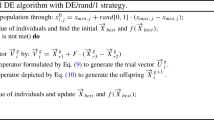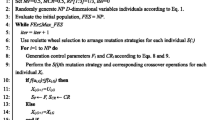Abstract
In conventional differential evolutionary (DE) algorithm, mutation operator has significant influence on generating new vectors by mixing existing target vectors randomly selected from the current population. Recently, many mutation operators, which usually employ the best individual or some high-quality individuals randomly chosen, have been proposed to improve searching capability. However, such designs may easily suffer from premature convergence trapped by local optima. To make a trade-off between exploration and exploitation capability, this paper proposes a novel collective intelligence (CI)-based mutation operator, which is named as “current-to-sa-ci-best.” In the presented mutation operator, the evolutionary information of m best target vectors is linearly combined to generate new mutant vectors. Besides, m is designed as an exponential-distributed random number which could be self-adapted based on successful records of m values alongside evolution. Moreover, this mutation operator could be applied to any DE algorithm without destroying existing search capability by adding a greedy selection operator. To verify its effectiveness, the proposed CI-based mutation strategy, which is named as SaCI, was embedded into some state-of-the-art DE variants on 28 CEC2013 benchmark functions. Numerical results have confirmed that the SaCI operator may be beneficial to DEs to some extent.


Similar content being viewed by others
References
Al-Ani A, Alsukker A, Khushaba RN (2013) Feature subset selection using differential evolution and a wheel based search strategy. Swarm Evolut Comput 9:15–26
Avlonitis M, Karydis I, Sioutas S (2015) Early prediction in collective intelligence on video users’ activity. Inf Sci 298:315–329
Brest J, Greiner S, Boskovic B, Mernik M, Zumer V (2006) Self-adapting control parameters in differential evolution: a comparative study on numerical benchmark problems. IEEE Trans Evol Comput 10(6):646–657
Cai HR, Chung CY, Wong KP (2008) Application of differential evolution algorithm for transient stability constrained optimal power flow. IEEE Trans Power Syst 23(2):719–728
Cui L, Li G, Lin Q, Chen J, Lu N (2016) Adaptive differential evolution algorithm with novel mutation strategies in multiple sub-populations. Comput Oper Res 67:155–173
Das S, Abraham A, Konar A (2008) Automatic clustering using an improved differential evolution algorithm. IEEE Trans Syst Man Cybern Part A Syst Hum 38(1):218–237
Das S, Suganthan PN (2011) Differential evolution: a survey of the state-of-the-art. IEEE Trans Evol Comput 15(1):4–31
Dash R, Dash PK, Bisoi R (2014) A self adaptive differential harmony search based optimized extreme learning machine for financial time series prediction. Swarm Evolut Comput 19:25–42
de-los-Cobos-Silva S, Mora-Gutierrez RA, Gutierrez-Andrade MA, Rincon-Garcia EA, Ponsich A, Lara-Velazquez P (2018) Development of seven hybrid methods based on collective intelligence for solving nonlinear constrained optimization problems. Artif Intell Rev 49(2):245–279
Derrac J, Garcia S, Molina D, Herrera F (2011) A practical tutorial on the use of nonparametric statistical tests as a methodology for comparing evolutionary and swarm intelligence algorithms. Swarm Evolut Comput 1(1):3–18
Garcia S, Fernandez A, Luengo J, Herrera F (2010) Advanced nonparametric tests for multiple comparisons in the design of experiments in computational intelligence and data mining: experimental analysis of power. Inf Sci 180(10):2044–2064
Gong W, Cai Z (2013) Differential evolution with ranking-based mutation operators. IEEE Trans Cybern 43(6):2066–2081
Gong W, Fialho A, Cai Z, Li H (2011) Adaptive strategy selection in differential evolution for numerical optimization: an empirical study. Inf Sci 181(24):5364–5386
Islam SM, Das S, Ghosh S, Roy S, Suganthan PN (2012) An adaptive differential evolution algorithm with novel mutation and crossover strategies for global numerical optimization. IEEE Trans Syst Man Cybern Part B Cybern 42(2):482–500
Jha DK, Chattopadhyay P, Sarkar S, Ray A (2016) Path planning in GPS-denied environments via collective intelligence of distributed sensor networks. Int J Control 89(5):984–999
Petrillo F, Gueheneuc YG, Pimenta M, Freitas CD, Khomh F (2019) Swarm debugging: the collective intelligence on interactive debugging. J Syst Softw 153:152–174
Qin AK, Huang VL, Suganthan PN (2009) Differential evolution algorithm with strategy adaptation for global numerical optimization. IEEE Trans Evol Comput 13(2):398–417
Schut MC (2010) On model design for simulation of collective intelligence. Inf Sci 180(1):132–155
Storn R, Price K (1997) Differential evolution—a simple and efficient heuristic for global optimization over continuous spaces. J Glob Optim 11(4):341–359
Tauscher K (2017) Leveraging collective intelligence: how to design and manage crowd-based business models. Bus Horiz 60(2):237–245
Villarreal-Cervantes MG, Alvarez-Gallegos J (2016) Off-line PID control tuning for a planar parallel robot using DE variants. Expert Syst Appl 64:444–454
Wang C, Liu Y, Liang X, Guo H, Chen Y, Zhao Y (2018) Self-adaptive differential evolution algorithm with hybrid mutation operator for parameters identification of PMSM. Soft Comput 22(4):1263–1285
Wang Y, Cai Z, Zhang Q (2011) Differential evolution with composite trial vector generation strategies and control parameters. IEEE Trans Evol Comput 15(1):55–66
Wu G, Mallipeddi R, Suganthan PN, Wang R, Chen H (2016) Differential evolution with multi-population based ensemble of mutation strategies. Inf Sci 329:329–345
Yang B, Yu T, Zhang XS, Li HF, Shu HC, Sang YY, Jiang L (2019) Dynamic leader based collective intelligence for maximum power point tracking of PV systems affected by partial shading condition. Energy Convers Manag 179:286–303
Yang GY, Dong ZY, Wong KP (2008) A modified differential evolution algorithm with fitness sharing for power system planning. IEEE Trans Power Syst 23(2):514–522
Zhang JQ, Sanderson AC (2009) JADE: adaptive differential evolution with optional external archive. IEEE Trans Evol Comput 13(5):945–958
Zheng LM, Zhang SX, Tang KS, Zheng SY (2017) Differential evolution powered by collective information. Inf Sci 399:13–29
Acknowledgements
The authors would like to thank Natural Science Foundation of China under Contract No. 51709027, 51506019; Natural Science Foundation of Liaoning Province, China under Contract No. 2014025006; Education Department General Project of Liaoning Province, China under Contract No. L2014209; Doctoral Scientific Research Foundation Project of Liaoning Province, China under Contract No. 20170520265; Yong Elite Scientists Sponsorship Program By CAST under Contract No. 2016QNRC001 for financially supporting this research; Fundamental Research Funds for the Central Universities under Contract No. 3132019007.
Author information
Authors and Affiliations
Corresponding author
Ethics declarations
Conflict of interest
The authors declare that they have no conflict of interest.
Additional information
Publisher's Note
Springer Nature remains neutral with regard to jurisdictional claims in published maps and institutional affiliations.
Rights and permissions
About this article
Cite this article
Feng, J., Zhang, J., Wang, C. et al. Self-adaptive collective intelligence-based mutation operator for differential evolution algorithms. J Supercomput 76, 876–896 (2020). https://doi.org/10.1007/s11227-019-03044-9
Published:
Issue Date:
DOI: https://doi.org/10.1007/s11227-019-03044-9




